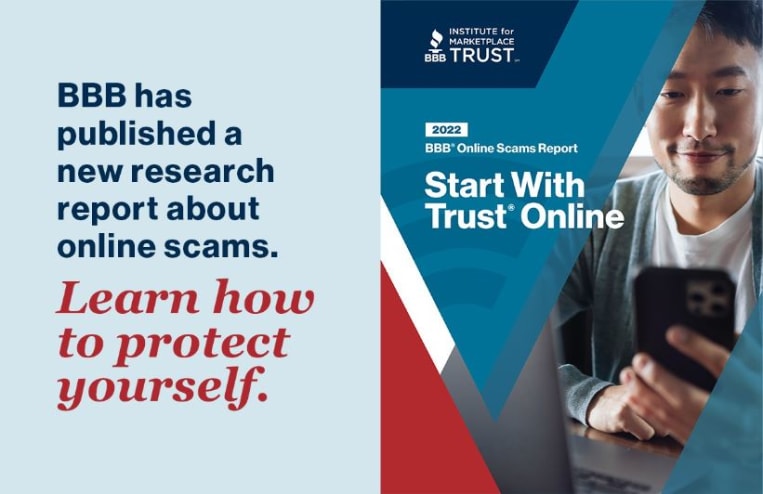
BBB Report: Scams perpetrated online rose 87% since 2015

(BBBI)
Tactics used by scammers have shifted drastically during the past several years, with scams being perpetrated online rising 87% since 2015, according to a new report published by the Better Business Bureau. During the same period, scams perpetrated by phone dropped by 42%.
The new report, Start With Trust® Online: BBB Online Scams Report, analyzes the changes in how scams are being perpetrated, including new information about impersonation and online purchase scams. This research paper is based on two sets of data: 1) An analysis of more than 300,000 reports submitted to BBB Scam TrackerSM between 2015 and 2022, and 2) survey research conducted in July 2022.
“The methods scammers use to target consumers have shifted significantly since BBB began collecting scam reports from the public in 2015,” said Melissa Lanning Trumpower, executive director of the BBB Institute for Marketplace Trust, which produced the report. “The shift in scam tactics is driven by a range of factors such as the rise of social media, world events, and changes in consumer behavior. Our latest findings reinforce the guidance we’ve been giving consumers to help them stay updated on these tactics to avoid losing money to scams.”
All scam types perpetrated online
So far in 2022, scams perpetrated online are more prevalent (55%) than other delivery methods, with a higher percentage of people losing money when targeted (75%). When breaking out scams perpetrated via phone with a monetary loss, scams perpetrated via text message rose from 11% in 2015 to 30% in 2022. Scams perpetrated via text had a median dollar loss of $800 in 2022, higher than other reported means of contact. Text messaging was the most reported offline method used to push people online.
“Carrots” appear to be riskier than “sticks,” according to our survey research. About 70% of respondents said they continued the online engagement because they hoped to gain something, sell something, or were curious to learn more. That’s compared to 30% who continued the engagement because they feared they’d lose something, were threatened, or thought there was an urgent situation they needed to address.
The scam type with a monetary loss most often reported beginning online was online purchase scams (89%), followed by cryptocurrency scams (87%), romance scams (85%), investment scams (73%), employment scams (68%), and government grant scams (64%).
The #1 place people reported being targeted by a scam was while browsing social media (25%), followed by online shopping (24%), email (14%), search engines (10%), and job search (7%).
Impersonation scams
Fifty-four percent of survey respondents said the scammer claimed to be from a legitimate organization to perpetrate the scam. People who lost money to a scam were almost twice as likely as those who avoided losing money to say the scammer used impersonation as a tactic. Of those who reported being targeted by an impersonation scam, 50% said the scammer pretended to be a well-known business.
Fifty-seven percent said they did not suspect the scammer was impersonating an organization or a person, while forty-three percent reported they suspected the impersonation. Sixty-eight percent of those surveyed did not ask the person to provide verification that they represented a legitimate organization. Those who did request verification reported being provided with fake business cards, websites, and other documentation.
Online purchase (shopping) scams
Online purchase scams continued to be the most reported scam type to BBB Scam Tracker in 2022, making up 30.0% of all scams reported, with 71.6% reporting a monetary loss. The reported median dollar loss for this type of scam rose from $101 in 2021 to $114 in 2022.
The reported median dollar loss for this scam type for ages 18-24 increased 25.8% from $124 in 2021 to $156 in 2022; this age group also reported the highest median dollar loss. According to the report, active-duty military reported losing significantly more money ($355) than veterans ($122), military spouses ($126), and non-military consumers ($111).
Other findings
Following their scam experience, 27% of those who lost money said they will hesitate to purchase products online; 19% of those who reported losing money said they will be more likely to purchase items in a store.
Thirty-one percent of survey respondents said they lost confidence/emotional well-being after being targeted by an online scam.
Prevention tips
How and where you search, research, and conduct transactions may impact your susceptibility to online scams. Tips for avoiding losing money to online scams:
- If the deal looks too good to be true, it probably is. Price was the top motivating factor for people who made a purchase and then lost money. Don’t shop on price alone.
- Be careful purchasing sought-after products. Scammers offer hard-to-find items and highly sought-after products at great prices.
- Before you buy, do your research with a trustworthy source. One of the best ways to avoid scams is to verify the offer and avoid making snap buying decisions.
- Avoid making quick purchases on social media. 25% of survey respondents reported being targeted while browsing social media.
- Use secure and traceable transactions. Avoid paying by wire transfer, prepaid money card, gift card, or other non-traditional payment methods.
- Choose your online payment system carefully. Take some time to understand the rules around your online payment system; not all will reimburse money if you get scammed.
- Don’t believe everything you see. Scammers are great at mimicking official seals, fonts, and other details. Just because a website or email looks official does not mean it is. For example, if a business displays a BBB Accredited Business seal, you can verify its legitimacy by going to BBB.org and looking up the company yourself.
- Ask for verification and take time to do research with a trustworthy source. People who lost money to a scam were almost twice as likely as those who avoided losing money to say the scammer used impersonation as a tactic.
- Be skeptical about anyone who reaches out to you unsolicited. Survey respondents told us scammers produced fake business cards, websites, credentials, ratings and more to convince them they were legitimate.
Resources
- For more highlights from the 2021 BBB Scam Tracker Risk Report, visit BBBMarketplaceTrust.org/OnlineScams
- Go to BBB.org/ScamTracker to report a scam, and learn more about other risky scams at BBB.org/ScamTips.
Related News
Still Need Assistance?
Contact Your Local BBB
Your local Better Business Bureau can assist you with finding businesses you can trust. Start With Trust®.
Additional Resources
Central Ohio BBB Business Podcast


